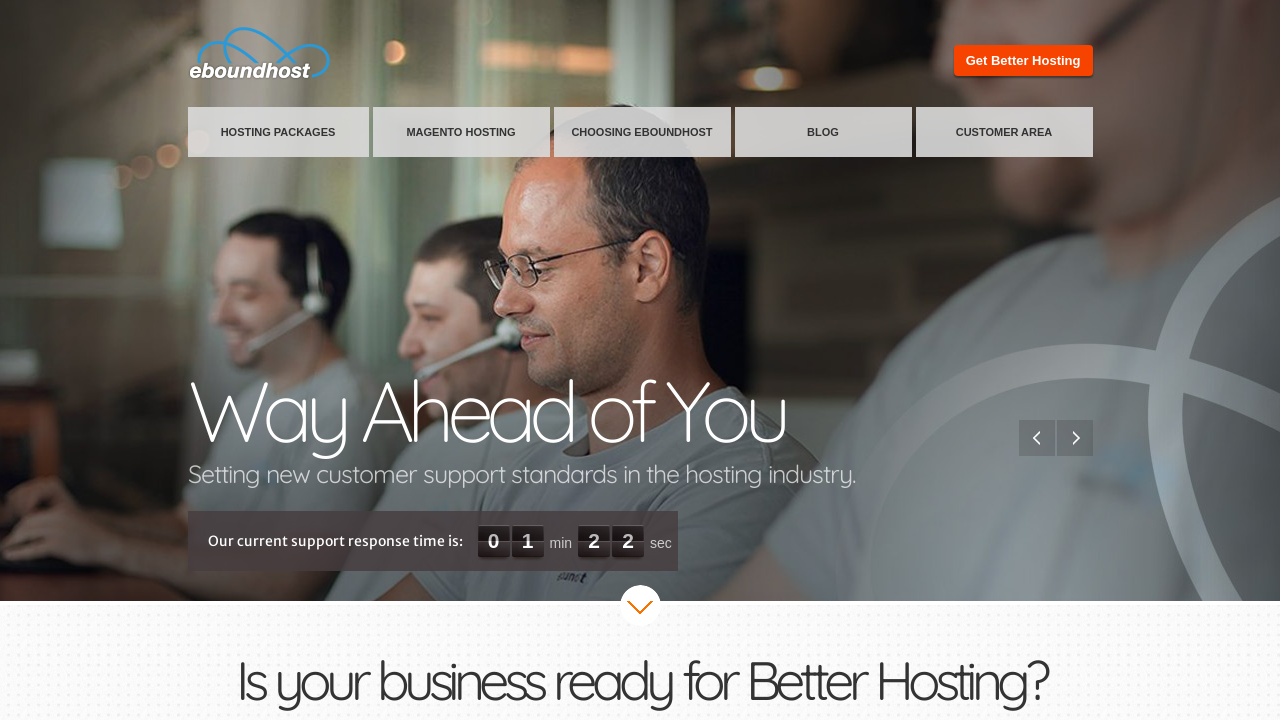eBoundHost Review
eBoundHost is a lesser-known yet reliable player in the web hosting industry. Established in 2000, it has been providing a range of hosting services, focusing on performance, security, and customer support. Here’s an in-depth look at eBoundHost’s services, their pros and cons, and how they compare to other popular web hosting providers.
Shared Hosting
eBoundHost offers shared hosting plans that cater to small businesses and personal websites. The key features of their shared hosting include:
- SSD Storage: Faster read and write speeds.
- Daily Backups: Automated backups for enhanced data security.
- Free SSL Certificates: Essential for securing websites.
- Unlimited Bandwidth: Suitable for sites with high traffic fluctuations.
VPS Hosting
Their Virtual Private Server Hosting comes with the following:
- Full Root Access: Allows advanced users to customize their environment.
- Guaranteed Resources: Dedicated CPU and RAM resources, ensuring consistent performance.
- SSD Storage: Like in shared hosting, SSD storage is provided for better performance.
- Scalability: Users can easily upgrade or downgrade based on their needs.
Dedicated Servers
For larger businesses or resource-intensive websites, eBoundHost provides Dedicated Servers, which include:
- Full Hardware Control: Users have exclusive access to all server resources.
- Managed and Unmanaged Options: Users can choose to have eBoundHost manage the server or handle it themselves.
- Custom Configuration: Flexibility to configure the hardware as per the needs.
Streaming Servers
One of the unique offerings from eBoundHost is their Streaming Server Hosting, designed for media-heavy websites that require robust streaming capabilities. These servers can handle significant amounts of traffic and provide uninterrupted streaming services.
Colocation Services
eBoundHost also offers Colocation Hosting, where businesses can rent physical space in their data center to host their own servers. This service is ideal for enterprises that need to maintain their own hardware but want the benefits of professional-grade data centers.
Strengths of eBoundHost 💪
1. Performance
With SSD storage across all hosting plans, eBoundHost prioritizes speed, which is a huge plus for users concerned with website loading times. Their dedicated server and VPS solutions also offer guaranteed resources, making them highly reliable for performance-driven applications.
2. Security
The company provides strong security features like daily backups and free SSL certificates across its hosting packages. Their data centers are designed to be highly secure, making eBoundHost a solid choice for businesses prioritizing data protection.
3. Customer Support
eBoundHost offers 24/7 support, with an emphasis on quick and efficient problem resolution. They are known for their helpful and knowledgeable support team, which is crucial for businesses requiring immediate assistance during downtime or technical issues.
Weaknesses of eBoundHost 👎
1. Lack of Global Data Centers
Unlike larger providers such as SiteGround or DigitalOcean, eBoundHost operates primarily out of its Chicago-based data center. This could affect website performance for users located far from the U.S., especially when compared to the global reach of competitors like Kinsta or OVHcloud.
2. Limited Scalability for Shared Hosting
Their shared hosting is designed for small websites, and while it’s reliable, it may not be suitable for websites that expect significant growth. Providers like Cloudways or DreamHost may offer more flexible plans for websites that need to scale quickly.
Comparing eBoundHost to Other Providers
1. eBoundHost vs. SiteGround
While both eBoundHost and SiteGround provide high-performance hosting with SSDs, [SiteGround](/providers/siteground/ offers a more extensive network of global data centers, which can result in better loading speeds for international audiences. SiteGround also includes more advanced WordPress-specific features in their shared hosting plans, which is a niche eBoundHost doesn’t cater to directly.
2. eBoundHost vs. DigitalOcean
DigitalOcean is a popular VPS provider known for its simplicity and developer-friendly approach. While eBoundHost’s VPS solutions provide similar performance, DigitalOcean offers more granular scalability and a broader range of pricing options, making it a more flexible choice for startups or developers who need cloud hosting services.
3. eBoundHost vs. OVHcloud
When comparing to OVHcloud, eBoundHost’s strength lies in customer support, which is more personalized. OVHcloud has a more extensive global infrastructure but is known for a more hands-off approach. If you value quick and reliable customer support, eBoundHost may be preferable, but for businesses needing worldwide data coverage, OVHcloud is a stronger contender.
4. eBoundHost vs. Cloudways
Cloudways provides cloud hosting management across multiple cloud providers (like AWS, Google Cloud), whereas eBoundHost focuses more on traditional hosting setups like VPS and dedicated servers. If you’re looking for cloud solutions with advanced management options, Cloudways might be a better fit, while eBoundHost is more straightforward and suitable for users who need a dedicated or streaming-focused infrastructure.
Conclusion
eBoundHost offers reliable and high-performance hosting services, particularly in VPS, dedicated servers, and streaming services. Their SSD-based hosting ensures speed, and the focus on security is commendable. However, their lack of global data centers and limited scalability in shared hosting may not be ideal for rapidly growing businesses or those with an international audience.
For businesses in the U.S. or those looking for niche hosting solutions like streaming or colocation, eBoundHost provides solid value with excellent customer support. However, if you’re seeking cloud-based scalability or international reach, other providers like Cloudways, DigitalOcean, or SiteGround may offer more competitive solutions.
For more information, visit eBoundHost.
